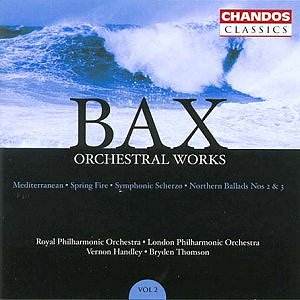Of all Bax’s major works, Spring Fire,
regarded by the composer ‘as a kind of freely-worked symphony’,
seems to have been the most unlucky. Scheduled for performance
in 1914, 1916 and 1919, it was never played in his lifetime and
remained unperformed until the composer’s death. Spring Fire
was influenced by paganism, fashionable at the time, and, in particular,
Swinburne’s poem Atalanta in Calydon that had also inspired
Bantock to write an extensive choral setting. Bax uses a large
orchestra for his vividly imaginative tone painting. The opening
movement, ‘In the Forest Before Dawn’, is a beautiful evocation
(cool horns, harp, flute and strings) to realise what Bax described
as rain-soaked woodlands, "the branches drip softly and a
damp delicate fragrance rises from the earth…"; another gloriously
scored impressionistic sound picture ‘Daybreak and Sunrise’ follows
without a break and the woodlands begin to stir as the denizens
awake from their winter sleep. In ‘Full Day’ the fauns, satyrs
and half-human shapes cavorting joyfully through sun-speckled
glades. This movement and the final ‘Maenads’ when Pan, Bacchus
and their retinues rush noisily through the forest are joyful
and hedonistic, and Handley fully realises the fiery youthful
ardour of the music unleashing a wild, pointed attack. In contrast,
his reading of the fourth movement ‘Woodland Love (Romance)’ with
its lovely broad melody is hauntingly languid, sensual and fragrant.
Northern Ballad No. 2 looks northward
for its imagery. It is Bax responding to the influence of Sibelius.
It is music to set the imagination flying and one is tempted to
visualise all manner of frightening myths and legends, malicious
shadowy shapes flitting across moonlit skies, and menacing, elemental
forces. Handley delivers an earth-shaking reading, violence relieved
by some still serenity. The briefer Northern Ballad No.
3, another work never played while Bax was alive, is mysterious
and atmospheric too, and it is only briefly in the central section
that one might describe the music as remotely ceremonial (in Bryden
Thomson’s hands anyway) like a ‘Prelude for a Solemn Occasion’
that is its enigmatic subtitle. Thomson also conducts Bax’s Mediterranean
recalling a holiday in Majorca. But this is one of Bax’s least
successful works, too derivative, a mishmash of waltz and Chabrier-like
Spanish rhythms.
Rounding off the album is Handley’s exuberant
reading of Bax’s short Symphonic Scherzo written
immediately after Spring Fire and sharing very much the
same joyful hedonistic atmosphere.
Chandos’s 2003 digital refurbishment reveals
even more fine detail of these richly complex orchestral textures.
Handley and a large RPO deliver the inspired,
hedonistic pagan legends-influenced Spring Fire with delicacy
and spirited attack.
Ian Lace
